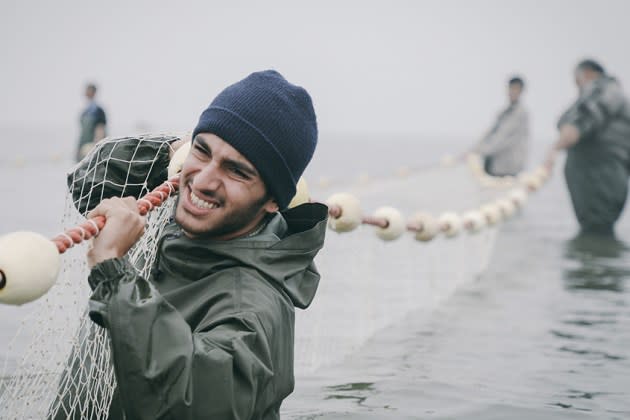‘Empty Nets’ Review: An Involving Iranian Drama About Diving Deep to Climb the Class Ladder

It’s hard to watch “Empty Nets” and not think of “Luzzu,” the recent, poignant Sundance prizewinner from Malta: In both films, enterprising young men left in the lurch by a national financial crisis must resort to black-market fishing to, well, stay afloat. (All we need is a third film paddling in such forbidden waters to declare a new neo-realist trend.) In “Luzzu,” the protagonist was a lifelong fisherman passionate about his trade, while Behrooz Karamizade’s lean, engrossing, Iran-set debut centers on a handy novice merely looking to make a quick buck. In this economy, however, such differences prove immaterial. It doesn’t matter where you’re coming from, unless you’re coming from money: You’re otherwise all sinking below the surface.
Premiering in the main competition at Karlovy Vary, this is a confidently quiet, elegiac first feature from Iranian-German writer-director Karamizade — who brings a certain European arthouse sheen to a story otherwise steeped in the stark modern tradition of Iranian social realism. It’s a combination that should secure this eminently accessible film a rather full net of further festival berths; given its limited name-recognition factor, distributors may be slower to bite. Still, “Empty Nets” feels like the kind of title that could surface later down the line in certain territories, should Karamizade make good on his promise in subsequent features.
More from Variety
Life seems fairly straightforward at the film’s outset for working-class urban twentysomething Amir (fresh-faced newcomer Hamid Reza Abbasi), whose free time revolves around the two things he loves most — open-water swimming and his adoring girlfriend Narges (Sadaf Asgari), which he tends to combine in oceanside trysts away from the city, where they must keep their romance a secret. There’s the complication: Narges comes from a wealthy, snooty family unlikely to consider Amir, who lives with his single mother (an excellent Pantea Panahiha) and makes a modest income as a cater-waiter, a suitable match for their princess. Still, he’s a striver, determined to save enough to afford her lofty dowry.
That plan hits a wall when Amir loses his job — blamelessly, let it be said, for employers and money men are consistently the villains here — and, owing to a general recession, is unable to find a new one close to home. Desperate, he follows the one lead he’s given, to a fishery some hundred miles away on the Caspian coastline, where workers are physically and financially exploited by coldly corrupt bosses. But it’s a living, and one in which Amir swiftly excels, in large part thanks to his prodigious swimming skills. When he learns that the best money is to be made via illegal nighttime operations to poach endangered wild sturgeon for their highly prized caviar — necessitating some hair-raising underwater labor — he’s quick to get involved.
The further downside to this risky, back-breaking work is that it severely limits the amount of time he can spend with an increasingly frustrated Narges — just as her parents are pushing her toward a well-off suitor of their choosing. “Money is all that matters,” he despairs, somewhat needlessly articulating the message staring them all in the face. His fishery roommate, would-be writer Omid (Keyvan Mohamadi), sees no future at all in a country he deems “one dead end after another,” and is just waiting for someone to smuggle him away across the water. But the seas are rough, the prospects murky.
As a portrait of entrenched inequality and diminished opportunities in contemporary Iran, this simple, solemn tale could hardly be more damning, even if Karamizade’s screenplay isn’t as knotty with political particulars as the work of outspoken compatriots like Mohamed Rasoulof — with whose 2020 Berlinale champ “There Is No Evil” this debut happens to share ace DP Ashkan Ashkani. In “Empty Nets,” Ashkani matches the film’s forecast with equally foreboding, storm-colored imagery, low on light and sometimes swallowed by the sea. Narges’ headscarves, in vivid shades of claret and turmeric, are somewhat tellingly the only warm tones to penetrate the murk: Even color is for the rich alone.
Albeit grounded in very glum reality, there’s a fable-like quality to “Empty Nets” as it trades in clean, contrasting archetypes: venal capitalistic ogres and virtuous victims predominate, though Amir gets more interesting as he gets more compromised, his plight luring him toward exploiting and failing his fellow men. Narges is slower to reveal such depths, though if some viewers are made to wonder whether she’s entirely worth the strife, that may be the script’s intent. More silently storied and sympathetic is Amir’s mom, cynical and bone-weary from a society that accords her little value, and the only person encouraging her son to put himself first, sink or swim.
Best of Variety
Sign up for Variety’s Newsletter. For the latest news, follow us on Facebook, Twitter, and Instagram.

 Yahoo News
Yahoo News 